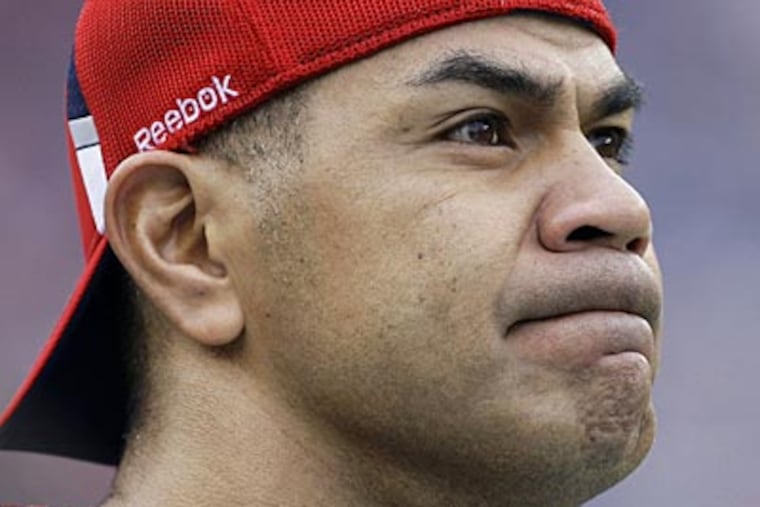Seau's death re-ignites debate on violent hits
Sadness and another round of concern over head injuries in football followed reports of Junior Seau's suicide Wednesday. "Tough to hear the news about Junior Seau. One of the best LBs to play the game," Eagles linebacker Casey Matthews wrote on Twitter. "Had his throwback USC #55 jersey. 1 of the reasons I was 55."

Sadness and another round of concern over head injuries in football followed reports of Junior Seau's suicide Wednesday.
"Tough to hear the news about Junior Seau. One of the best LBs to play the game," Eagles linebacker Casey Matthews wrote on Twitter. "Had his throwback USC #55 jersey. 1 of the reasons I was 55."
Matthews grew up near USC and wore 55 in college.
"Saddened to hear the news about Seau. Thoughts and prayers are with his family," Eagles linebacker DeMeco Ryans posted on Twitter. "R.I.P. to one of the greatest of all time."
The news of Seau's death came hours after debate erupted over the NFL's decision to suspend four players for their roles in a bounty program with the Saints.
Seau's death in California, after apparently shooting himself in the chest, according to police, echoed the recent suicides of other former NFL players, including ex-Eagle Andre Waters and former Bear Dave Duerson, who shot himself in the chest last year and asked that his brain be sent to researchers studying the longterm effects of brain injuries.
Junior Seau was 43.
But doctors have cautioned that they have not established a definitive link between brain injuries and suicide, and it's not known whether Seau suffered from the same condition found in Waters, Duerson and other football players who have committed suicide.
Studies, though, have shown a connection between brain injuries and chronic traumatic encephalopathy (CTE), a degenerative brain disease that can lead to impaired judgment, depression and dementia similar to Alzheimer's disease.
Finding CTE requires a postmortem study of the brain, so no one can say yet whether Seau had the condition. But it has been found in dozens of other athletes in various sports, including Waters and Duerson, as well as Owen Thomas, a former Penn football player who hanged himself in 2010, and Terry Long, an ex-Steeler who killed himself by drinking anti-freeze.
Suicide, though, cannot be directly linked to CTE, said Penn neurologist Doug Smith.
"We've never really defined what CTE is and what the true clinical manifestations are," said Smith, director of Penn's Center for Brain Injury and Repair. "I'm not saying it does not have a link with things like suicide, it's just that has never been shown."
Doctors at Boston University who have studied CTE in numerous athletes have urged similar caution.
But suicides by players suffering from CTE have increasingly captured public attention.
"The side effects of head trauma are a serious issue that can not be ignored," Eagles guard Evan Mathis wrote on Twitter. "Junior Seau's death will bring the topic into the spotlight."
More than 1,000 former players are suing the NFL, accusing the league of downplaying the effects of concussions for years before treating the issue more seriously.
Athletes, professional or amateur, who have had just one mild to severe brain injury can show signs of the degenerative brain disease, Smith said. Thomas, the Penn lineman, had never been disagnosed with a concussion.
Smith noted that many who do suffer concussions live full lives.
"It does highlight the need to investigate this to see what really encompasses chronic traumatic encephalopathy," he said.